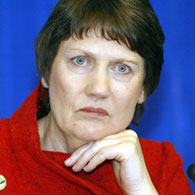Recent events have reminded me of the utter sickening bad taste that I should get from politics - that bad taste I forget runs through the heart of politics - it is the poison of people whose single minded obsession is control, and who seek it through lies, through force and who are blind to the failings of their own tribe.
^
I can remember feeling a bit of this on a couple of occasions. Jim Bolger's political lynching of Ruth Richardson following the 1993 election. David Lange's sacrificing of Roger Douglas after Cabinet agreed on a flat tax. The British Tories political lynching of Margaret Thatcher.
^
However now I am bitter. I am bitter at the depraved depths of Labour and Helen Clark in particular to engage in personal attacks on Don Brash. However I am also bitter at the charlatan whore masters of McCully and co. for advising Brash to be less than himself for the election, and for the National caucus to have sold him down the proverbial river, having milked him for a 86% increase in the vote. Politics is a tough game, but it also is a game largely fought by people who are - lets face it - lowlifes.
^
The filthy personal politics of New Zealand is something not seen since the days of the Colin Moyle affair. Even some of the most rancerous relationships did not drop this low. It has been played by some on both sides. Those on the religious conservative right would target Helen Clark's marriage and sexuality, cretins like Ian Wishart are now attacking David Benson Pope who, while being a prick, has every right to engage in (or not engage in) whatever consensual kinky adult sex he wishes. I simply don't care. I don't care if Helen Clark's marriage is passionate and kinky, or ascetic and convenient. However, while some in National play that game, Brash did not. At worst he made ill advised statements about "mainstream New Zealanders" - these backfired - showing what little use the spin whores are.
^
Don Brash did not attack Helen Clark personally. Helen Clark called Don Brash cancerous, and painted him as racist. The left has painted Brash as leading some sort of elite club which wanted to oil New Zealand industry with the blood of poor Maori kids, as if there was an agenda to privatise, dismantle welfare and state health and education - leaving poor families homeless without access to schools, hospitals or jobs. This is complete nonsense, and the spin doctors on the left know it - but frightening the poor, particularly those with low levels of education or poor command of English is the stock in trade of the left. Telling them that Don Brash is a rich white man out to cut their benefits, make them pay for school and the doctor, and cut their wages - helps keep them dependent on Labour doesn't it? These same people painted Brash as Monty Burns from the Simpsons - both
the Greens and
Jordan Carter did. The Greens like to paint themselves as peaceful and playing the ball not the man - what nonsense. The left is nasty when cornered, as nasty as the likes of Wishart and those on the right who they accuse.
^
The despicable lie that Brash was racist, anti-Maori and
wanted to destroy Maori, is part of the currency of hate and name calling that is part of the hard left. Political correctness was the term coined by Mao Tse Tung to criticise those using the wrong language and wrong views - Brash called for the state to be colourblind. You know, like the civil rights movement in the USA, like the anti-apartheid movement in South Africa (remember Brash protested against the Springbok tour). Anyone calling Brash racist is either stupid or downright despicable. It is an easy way to shut down an argument - insult the person with the different view, don't even debate it. Hone Harawira doesn't know better, the left does. It knows Brash comes from an honourable classical liberal position - it may be true that some in National went along with it because it saw votes in scratching the Maori bashing views of some people - but Brash was not a part of that. Remember Labour started reviewing some of its programmes to remove such an element? Forgot that didn't you? Oh yes, it isn't happening anymore since Labour won the election.
^
However despicable the Labour party and its sycophantic bauble grabbing toadies, Winston Peters and Peter Dunne, are, it is difficult to beat the refusal to confront Labour's misspending of taxpayer's funds for the election campaign. Labour changes the law to legalise it, but refuses to change the law to legalise National's mistake.
The tribal hatred expressed by the Labour party and its supporters, and their own deluded, almost Orwellian belief in the honour of their cause is bizarre and quite revolting. You might like Labour,
but to believe it has a monopoly on good intentions and
is inspirational shows a low intellectual and emotional threshold for inspiration. I am sure the next spider that climbs up the water spout will be just as inspiring. Seriously- mainstream politics is a revolting sport of tribes made up of mostly intellectual pygmies with the independent thought of sheep, with a handful of very smart very focused power hungry control freaks who know only too well what they want. If that inspires you then join the mafia, it is more honest about how it treats people's lives and property. Remember Labour trusted Brash to run monetary policy for two and half years, and before then two years (appointing the man and yes Clark and Cullen were in that Cabinet). His intellectual credentials are difficult to beat.
^
However, I already knew the Labour party was full of people who think they know what is best for everyone, the ones who think they know best how to spend other people's money, how best to provide your kids' education, supply the healthcare you need and how to regulate your business, your body and your life. Labour is a party, fundamentally, of social engineering and change.
^
It is National that I am particularly disgusted with. Yes I know it is best if the Nats regroup and focus on Labour, but I doubt than only a few National MPs must be thinking how filthy politics has become that Brash has been chewed and spat out. Brash was different from them. He understood ideas, principles and the application of principles to policy. He was the most principled leader National had had for twenty years (Jim McLay was the last and short lived as leader). I debated policy with Brash personally a couple of times, unlike other politicians he has a formidable brain and thoughtful - he didn't spin, he does believe in individual freedom and he does believe in the dignity of the human individual. It is not race, sex or sexuality coloured - he is a liberal - something that Labour loathed and lied about, and which some of his advisors wanted hidden (to get out the Christian vote).
^
National nearly won the election, primarily on two messages:
^
1. Race based laws and government funding are wrong;
2. Government wastes too much of your money, you deserve some back.
^
Brash created and sold these messages. Bill English in 2002 campaigned on the basis of..... what? Exactly. Nothing.
^
Brash resigned because the people whose jobs are largely because of him would not stand up for him - they are too stupid, gutless or lazy to argue that Nicky Hager's book is muckraking of little substance and that Hager is essentially a sycophant of the Greens/Alliance. Unfortunately, Brash's biggest mistakes were in not following his instincts. He could've been upfront about the Exclusive Brethren, shutting down the loudest non-issue since the election. He could've refused to talk about marriage, mainstream New Zealanders or any other pandering to the conservative instincts of some in the party - and brought more of urban Auckland, Wellington and Christchurch with him. Unfortunately, he was tainted by the National Party and the gutless unprincipled disloyal caucus who have now promoted the only possible alternative leader, and a man who nearly destroyed National.
^
Bill English in 2002 didn't talk about tax cuts, or ending race based funding. He sold Labour Lite and cost National the 2002 election and to some extent the 2005 election too. Had he not decimated National's vote in 2002, it would've had more MPs, more funding, more experience to contest 2005. English is one of the 1990s so called "Brat Pack", who are about as radical as an untucked shirt.
^
So English will be finance spokesman - Brash wont be, he is tainted goods -good enough to get the bastards nearly twice the seats of last time - but no. Brash vs. Cullen on the budget would be a debate worth seeing, but Cullen will make mincemeat of English - and frankly if he does, I will look forward to it. Cullen is smarter and wittier, and it will serve the Nats right. English will sell out everything he can to win Labour voters - that, after all, is the National Party way.
^
So that is politics. The National Party has shrugged off its most successful leader since 1990 (when Labour handed it a victory, and it lied comprehensively to get elected), for a leader who stands for little and a deputy leader who was its most unsuccessful leader in its entire political history. It is turning its back on colourblind law and funding, it is turning its back on tax cuts and less government, and more "clever smarter" ways of spending your money and telling you what to do and what not to do. It chose this over a robust defence of Brash, when if they truly believed that Hager's book shows them to be immoral, they should all resign. Resign or stand behind Brash - disloyal unprincipled pricks.
^
So what now? Well if you believe in individual freedom, less government and the end to race based laws you might be looking at ACT and the Libertarianz. Libertarianz did, after all, take Helen Clark to court (the Nats didn't).
^
Or you might just decide it is time to spend a few months living your life, enjoying yourself and ignoring the 119 bastards in Wellington who want to make New Zealand a better place by doing more "for you" and spending "your money" for the community. Why just 119? Well I'm giving Brash a break, and even think Rodney Hide has it in him to be different. I'm not inspired by politics at all.
^
Speaking of which. Don? Resign. Get out of it all. Leave them alone. You've done your party proud. If they can't give you anything worthy of your intellect and honour, then leave politics behind, hold your head high and write another piece for
The Free Radical. Not PC will welcome it! It might even get rid of the bad taste in my mouth.





